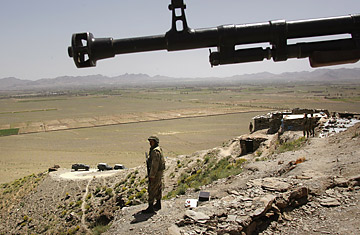
A Pakistani army soldier stands guard at a military outpost near Wana in Pakistan's South Waziristan tribal area near the Afghan border
(2 of 2)
"There is a proxy war going on, involving Kabul, Kashmir and Quetta," says Mushahid Hussain, a prominent politician who was close to former military ruler President Pervez Musharraf. "Here you want Pakistan to play a pivotal role. But the real fly in the ointment is that by including India in the contact group, the Obama Administration has been insensitive to the fact that Indian and Pakistani interests diverge." The contact group is composed of countries in the area that the Obama Administration has brought in to deal with regional crises. India and Pakistan are both part of the group, even though their mutual animosity goes back to their independence from Britain in 1947. (Read "Can Pakistan Be Untangled from the Taliban?")
Zardari's U.S.-backed government is continuing to struggle. The recent political turmoil has settled but has left the already unpopular President in a weaker position, making it even more difficult for him to influence the army and a skeptical public. "The ISI is run by the army and will do what [Army chief] General [Ashfaq] Kayani wants," says Sethi.
The situation is further complicated by the desire of Pakistan's politicians to pursue a strategy that is seen as being independent of Washington. During Foreign Minister Shah Mahmood Qureshi's press conference with Holbrooke and Mullen, Qureshi insisted that there were "red lines" that Washington should not cross. "The bottom line is a question of trust," he said. "We are partners, and we want to be partners. We can only work together if we respect each other. There is no other way. Nothing else will work." Mullen agreed that the two allies should work toward a "surplus of trust," while Holbrooke said that "the United States and Pakistan face a common strategic threat, a common enemy and a common change, and therefore a common task."
Still, many Pakistani politicians and analysts believe Washington should play a subtler role in that pursuit. "This is what I said to Holbrooke and Mullen," says Sethi. "It fuels anti-Americanism. I told Holbrooke that leaking allegations against the ISI is counterproductive. I told Mullen that the closer he appears to Kayani, the more he will feel the need to demonstrate his independence to his constituency ... I don't understand why they can't be more discreet."
Sherry Rehman, a prominent member of Zardari's ruling Pakistan People's Party (PPP) and a former minister, echoes the sentiment but allows that Islamabad should step up in its own efforts to battle the militants. "What is not helpful is saying that it is someone else's war," she says. "Yes, it may have arisen from interventions in the past such as in the Afghan jihad, but this is a very clear [and] present challenge. Whether it is homegrown or not, it is now in Pakistan, and solutions can only come up at a national level. International intervention has never really worked here. We have to own it as our own problem now. It is our country. Our land. We have to face the problem and do something about it."
— With reporting by Vivian Salama / Islamabad
